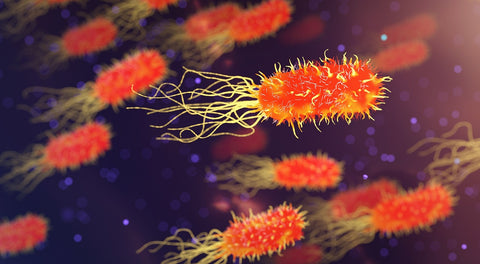Our immune system, a complex network of cells, proteins, and organs, stands as a sentinel, defending us against a myriad of external threats. At the core of this defense mechanism lies the potent relationship between nutrition and immunity. This article delves into the science of how nutrients fuel our immune responses, highlighting key vitamins and minerals essential for robust immune health. Emphasis is placed on the importance of a diversified, balanced diet, showcasing the harmony between various food groups and the comprehensive benefits they offer. Beyond nutrition, the piece underscores the integral role of lifestyle factors such as sleep, physical activity, stress management, and social connections in bolstering immune function. Concluding with a call to action, readers are urged to reflect on their daily choices and recognize the profound impact of these decisions on their immune health. A recommended image illustrates the symbiosis between nature and nutrition, encapsulating the article's essence.
Introduction
In the vast tapestry of human health, immunity stands as a sentinel, a guardian that tirelessly works to fend off external threats and maintain our well-being. It's a system so intricate, so beautifully designed, that it can identify and combat millions of potential invaders. But what fuels this sentinel? What gives it the strength to stand tall against the myriad of microbes and pathogens we encounter daily? The answer lies in the very sustenance we take in: our nutrition.
Every meal we consume, every morsel that passes our lips, carries the potential to either fortify or weaken our body's defences. In an age where health is paramount and threats like viruses and bacteria loom large, understanding the intimate dance between nutrition and immunity is not just beneficial—it's essential. This exploration seeks to unravel the powerful synergy between the foods we eat and our body's ability to defend itself, hoping to provide insights into a holistic approach to health and well-being.
As we embark on this journey, let us remember a simple truth: our body is a masterpiece of nature, and like any masterpiece, it deserves the finest care and attention. Through the lens of nutrition, we will discover how to nurture and enhance our body's natural defences, ensuring that our immunity remains robust and resilient, regardless of the challenges we face.
The Science Behind Nutrition and Immunity
Every bite of food we consume holds a symphony of nutrients, a myriad of molecules that collectively contribute to our body's functions. When it comes to immunity, this relationship becomes even more profound. To understand the impact of nutrition on our immune system, we need to journey into the cellular realm, where the magic truly unfolds.
Cells at the Forefront: At the heart of our immune system lie various cellular warriors—white blood cells like lymphocytes, neutrophils, and macrophages. These cells patrol our body, scouting for foreign invaders and neutralizing them. Adequate nutrition ensures that these cells are not just numerous, but also vigorous and effective in their combat.
Signaling and Communication: Beyond just cellular soldiers, our body possesses an intricate communication system. Cytokines, for instance, are proteins that act like messengers, signaling cells on where to go and when to attack. Nutritional elements play a role in modulating these signals, ensuring that our immune responses are coordinated and timely.
Barrier Maintenance: Our body's first line of defense is often physical barriers like the skin and mucous membranes. Essential fatty acids, vitamins, and minerals help maintain the integrity of these barriers, ensuring they remain impermeable to potential threats.
Repair and Recovery: After an immune response, our body needs to repair any collateral damage and recover. Antioxidants, present in various foods, help mitigate oxidative stress, promoting faster recovery and minimizing cellular damage.
Example: Dr. Priya's Nutritional Interventions - Dr. Priya, an immunologist, often encountered patients with weakened immune responses. By analyzing their diets, she would frequently discover deficiencies in key nutrients. When she introduced them to a diet rich in diverse vitamins, minerals, and antioxidants, many reported fewer illnesses and quicker recovery times.
In essence, the science paints a clear picture: nutrition is not just about satiety or energy—it's about orchestrating a cascade of biological processes that empower our immune system, enabling it to function at its zenith.
Key Nutrients and Their Roles
Amidst the plethora of nutrients available through our diet, certain ones stand out for their pronounced impact on immune function. These pivotal players in the realm of nutrition ensure that our body's defenses remain vigilant and formidable. Here, we delve deeper into these key nutrients, understanding their roles and sources.
-
Vitamin C: A potent antioxidant, vitamin C is quintessential for the body's defense system. It stimulates the production and function of white blood cells, particularly lymphocytes and phagocytes, helping them perform their protective roles more effectively. Moreover, it helps maintain skin integrity, acting as a barrier against harmful invaders.
- Sources: Citrus fruits (like oranges, lemons, and grapefruits), strawberries, bell peppers, and broccoli.
-
Vitamin D: Often termed the "sunshine vitamin," vitamin D plays a dual role. It aids in bone health and modulates immune responses, ensuring that our defenses neither underact nor overact, striking a balanced response.
- Sources: Sun exposure, fatty fish (like salmon and mackerel), fortified cereals, and egg yolks.
-
Zinc: A trace element with a colossal impact, zinc is pivotal for immune cell development, enzyme function, and protein synthesis. It also plays a role in cellular communication, ensuring our defenses are timely and coordinated.
- Sources: Lean meats (like chicken and beef), dairy products, nuts (like almonds and cashews), and legumes (like chickpeas and lentils).
-
Probiotics: These are the 'good' bacteria that colonize our gut. A significant portion of our immune activity is rooted in the gut, making these beneficial bacteria vital for modulating immune responses and keeping harmful pathogens in check.
- Sources: Yogurts, fermented foods (like kimchi and sauerkraut), and certain cheeses (like Gouda and mozzarella).
Example: Anika's Immunity Boosting Regime - Anika, a nutritionist, always noticed a spike in common cold cases during winters. To combat this, she would recommend an "immune-boosting" plate to her clients, emphasizing foods rich in vitamin C, vitamin D, and zinc. Those who heeded her advice often sailed through the cold season with minimal health hiccups.
Ensuring that these nutrients are adequately represented in our diet is crucial. However, it's essential to remember that the synergy between various nutrients often amplifies their effects. Hence, a diversified and balanced diet stands as the cornerstone of robust immunity.
The Balanced Plate: Diverse Nutrition for Robust Immunity
In the world of nutrition, it's easy to get entangled in the allure of specific 'superfoods' or magic bullets that promise optimal health. However, the true essence of nutrition lies not in individual foods but in the harmony of a well-rounded diet. A tapestry of colors, flavors, and nutrients ensures that our immune system receives a complete toolkit to function efficiently.
Diversity is Key: Every food group brings its unique set of nutrients. Vegetables offer vitamins, minerals, and fiber. Proteins, be it from animal or plant sources, supply amino acids essential for immune cell functions. Grains provide energy, while fats ensure the absorption of fat-soluble vitamins. The mantra is simple: diversity on the plate equates to a well-fed immune system.
Colors and Phytonutrients: Nature has a beautiful way of signaling nutrient content through colors. Brightly colored fruits and vegetables are often rich in phytonutrients—natural compounds that have antioxidant, anti-inflammatory, and immune-boosting properties. By ensuring a "rainbow" on our plate, we inherently provide our body with a spectrum of these beneficial compounds.
Example: Suresh's Transformation - Suresh, traditionally a meat and potatoes kind of guy, rarely indulged in vegetables or fruits. However, upon reading about the importance of diverse nutrition, he started incorporating a broader range of foods. He added greens, berries, seeds, and diverse grains to his meals. Over time, not only did his energy levels soar, but he also noticed fewer seasonal illnesses and a generally enhanced sense of well-being.
Mindful Eating: Beyond the type of foods we consume, the manner in which we eat also impacts our nutrition. Mindful eating, which involves savoring each bite and being present during meals, can aid digestion and enhance nutrient absorption. Moreover, listening to our body's hunger and satiety cues ensures we don't overconsume, maintaining a balance.
Hydration and Immunity: Water, often overlooked, plays a pivotal role in immune health. It aids in the production of lymph—a fluid that circulates white blood cells and nutrients. Ensuring adequate hydration, thus, indirectly bolsters our immune responses.
In the realm of nutrition and immunity, it's evident that there's no singular hero. The true power lies in the ensemble—a well-balanced, diverse diet that provides all the essential nutrients in harmony, setting the stage for a robust and resilient immune system.
Beyond Food: Lifestyle Factors Influencing Immunity
While the symbiosis between nutrition and immunity is undeniable, it's essential to recognize that our overall lifestyle significantly influences our immune health. Our daily habits, choices, and routines either fortify our defenses or render them vulnerable. To foster a robust immune system, it's crucial to adopt a holistic view, understanding that multiple facets of our lives play a role.
Sleep and Recovery: Sleep isn't merely a rest phase; it's the body's dedicated time for repair and rejuvenation. Chronic sleep deprivation can lead to an imbalance in immune-related proteins and hormones, potentially hampering our ability to fend off infections. Aim for 7-9 hours of quality sleep, ensuring a consistent routine.
Physical Activity: Regular exercise not only builds stamina and strength but also has immune-enhancing properties. It promotes good circulation, ensuring immune cells move efficiently throughout the body. Whether it's a brisk walk, yoga, or a high-intensity workout, staying active is vital.
Stress and Immunity: Chronic stress can wreak havoc on our immune system by releasing a continuous stream of stress hormones. These can suppress immune functions, making us more susceptible to illnesses. Incorporating relaxation techniques, such as meditation, deep breathing, or even hobbies, can mitigate stress's impact.
Avoiding Toxins: Excessive alcohol consumption and smoking can impair the immune system, leaving us more vulnerable to infections. It's advisable to consume alcohol in moderation and to avoid smoking altogether.
Example: Lucas's Lifestyle Shift - Lucas, a software developer, led a sedentary life, often burning the midnight oil, subsisting on caffeine, and grappling with deadlines. This lifestyle took a toll on his immunity, leading to frequent illnesses. Upon a friend's advice, he adopted a more balanced lifestyle—prioritizing sleep, incorporating daily walks, practicing mindfulness, and reducing caffeine. Over time, Lucas felt a profound change, not only in his immune health but also in his overall well-being.
Maintaining a Healthy Weight: Excess weight, especially around the abdomen, can influence the efficacy of white blood cells, making them less adept at fending off infections. Adopting a balanced diet and regular exercise routine can assist in achieving and maintaining a healthy weight.
Social Connections: While not directly related to nutrition, social interactions play a role in our mental well-being. Feeling connected and having supportive relationships can boost our mood and, in turn, have positive effects on our immune function.
To truly harness the power of our immune system, it's clear that we must view it within the broader context of our lives. Every choice, from the food we consume to the hours we sleep, molds our immune responses, ensuring they remain primed and ready for any challenge that comes their way.
Conclusion
In the intricate dance of life, where threats to our health are constant and varied, our immune system stands as our unwavering shield, a biological marvel that guards and protects. The realization that nutrition plays a starring role in powering this shield adds another layer of reverence to the food we consume and the choices we make daily.
But, as we've discovered, it's not just about the food. It's about the symphony of lifestyle choices that together forge a forcefield of resilience around us. Sleep, exercise, stress management, and our connections with others—all play their unique notes in the grand orchestra of immune health.
While the world may be replete with quick fixes and miracle cures, the path to genuine health and robust immunity isn't hidden in a pill or a potion. It's woven into the fabric of our daily lives, in the meals we savor, the sleep we cherish, the stresses we alleviate, and the bonds we nurture.
Take a moment today to reflect on your choices. Are they serving your immune health? If not, remember, every meal, every night's sleep, and every moment of relaxation is an opportunity to reinforce your body's natural defenses. Let's pledge to nurture our immunity, ensuring it remains the vigilant guardian it's meant to be.
*NOTE : ALL THE NAMES USED IN THE EXAMPLES ARE PURELY FICTIONAL AND HAVE BEEN INCLUDED FOR CONTEXT. THEY DO NOT REPRESENT ANYBODY IN THE REAL WORLD.




Comments (0)
There are no comments for this article. Be the first one to leave a message!